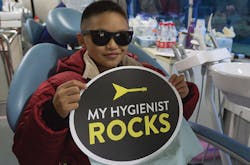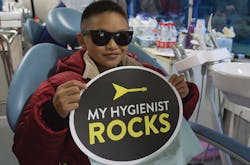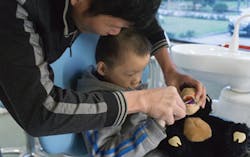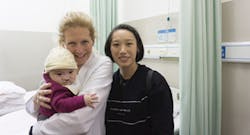Veteran of charity trips shares tips on getting involved with dental missions
by Dorothy S. Ferreira, RDH, BSDH
How many of you remember the ad tagline, “Join the ADHA. See the world”? Oh wait, that was for the Army, not dental hygiene. But there is a league of dental hygienists who have taken this slogan to heart. They head out for a week or more each year to use their skills and help underserved populations the world over. Would you like to join them?
I fell into doing...
...dental hygiene on mission trips by chance. One of my patients mentioned that an organization her Rotary Club supported was looking for volunteer dental hygienists. The group is Alliance for Smiles, and they perform cleft lip and palate reparative surgeries on children in developing areas of the world. Six months after I spoke with her, I was on my way to Bangladesh. That was eight years ago, and so far, I’ve worked with teams on 15 missions and I’m preparing for my 16th as I write this.
I knew nothing about medical missions and what it would be like to practice dental hygiene in an unfamiliar environment, but I’ve always been a jump-in-head-first-and-think-about-the-consequences-later kind of person. So I headed off to Dhaka, ready to take on the world. When we arrived at the hospital, we found the dental equipment did not work and our patients could not speak English. My education in adapting began. Even my porte polisher from my ancient dental hygiene kit would have been helpful in dealing with the betel nut stains. No matter what I thought I knew beforehand, nothing could have prepared me for the overwhelming emotion that came over me each time I worked with a person who thanked me for the care I provided them. How exciting it was to see the children practicing their new brushing technique that I taught them through charades.
There are things I wish I had known before going on my first mission. I spoke with a few other hygienists who have served on mission teams to get their ideas too. I hope that reading about our experiences will inspire you to volunteer with an organization and change lives, not the least of which will be your own.
The first thing you’ll need to do is find an organization with which to volunteer. While all of the hygienists I spoke with found out about a group the same way I did—through someone they knew—you can find organizations on your own. The ADA Foundation website (http://internationalvolunteer.ada.org/volunteer-connection/) provides a long list of organizations and missions that are looking for dental volunteers. Another company, Volunteer Forever (https://www.volunteerforever.com/article_post/dental-volunteer-abroad-medical-mission-trips-dentists-students), is a for-profit company that helps people find volunteer opportunities all over the world.
Research the organization you’re thinking of signing with and contact them for details. Things you will want to ask about are: What is their history and mission statement? What documents will you need to submit with your application? What kind of work will the team be doing? How will they use your skills as a dental hygienist? What are your financial obligations? (Some organizations require a participation fee but cover the rest of your travel costs while others have you pay for the entire trip. This will depend on the group and how they’re organized. I’ve been on both kinds of missions—ones where I’ve had to pay my own way and others that are covered by a grant.) What vaccinations, prophylactic medication, and visas do you need? Does your group cover any of those costs? (If not, you’ll need to figure all of that into your budget.)
What are the travel arrangements and who handles them? Do they use a travel agent or will you be responsible for booking your own flights? What are your luggage restrictions? (Some airlines allow one bag per person while others allow two. On Alliance for Smiles missions, team members are permitted one personal bag and are provided a second one that’s filled with equipment and supplies. Airlines also have weight restrictions for your checked luggage and carry-ons. Make sure you learn what the requirements are so that you do not incur large fees at the airport.)
What are the organization’s provisions for security? (You need to be realistic here. You might be traveling to areas that are not as stable as the US.) Does the organization have procedures in place in case of trouble? (I’ve been on a few missions where there were issues in the country while our group was there. I’ve always felt comfortable with the precautions our mission directors took to ensure our safety. Make sure any group you sign on with can do the same.)
What is the housing situation? (Depending on the mission, I’ve been in very nice hotels, college-style dorm rooms, and everything in between. I’ve had to heat water in a bucket to shower, and stayed in hot regions in a room without air conditioning. If you’re particular about what type of housing you stay in, check it out before you sign on.) Have you been assigned a roommate or can you pay extra for a single room? (I choose to have a roommate because it helps me to get to know another member of the team.)
How are meals handled? Are they arranged by the mission director or are you on your own? If you have specific dietary needs, will they be able to accommodate them? If not, are you able to bring some of your own supplies? (I’ve been on missions in Bangladesh four times. Let’s just say I’m not a big fan of curry, and yet almost everything we were served there had curry. I’ve learned to travel with protein bars and shake mixes to make sure I don’t go hungry.)
Cultural sensitivity while on a mission
When you’re on a mission, you need to remember you’re not at home. Things wi.ll be different. It is vital that you are mindful not to insult the local professionals by complaining about their facilities, boasting about how much better your equipment is in the States, or flaunting all that you have at home. Take this time to learn about another culture’s people, customs, and beliefs. I speak to my local counterparts upon arrival and ask them to share their cultural rules, and to let me know if I do anything improper. I’ve made missteps through the years and I’m quick to apologize, explain my ignorance, and thank the person for helping me learn.
This goes the other way too. There might be times when local people will say or ask you something that would be considered rude in the US. I used to be overweight. When I arrived in Bangladesh, people asked me why I was so fat. It took me a while to realize they did not mean to insult me; they just were unused to seeing someone my size. They were curious and it was not socially unacceptable to discuss someone’s weight. Now that I’ve lost the weight, they all want to know about that.
Who is responsible for your supplies and equipment? Do they provide everything or do you need to bring your own? Do you have special instruments you like to work with? (If so, you might want to pack them and bring them with you.) Do you have a great relationship with one of your sales reps? If so, ask him or her to donate your favorite varnish or disposables so you can bring them along. (After a visit in Bangladesh, I started soliciting donations for mission equipment. What I could not get donated I saved for and bought on my own. Since our goal is to provide the same level of care we give to patients here in the US, I wanted to make sure I had what I use at my home office.)
Once you’ve found a group and set a date, what comes next? Here are some things you should think about.
Adaptability
You need to remember that you’re not going to work at your local dental office. Equipment—what there is of it—may not work. I wore my camping headlamp one time when I realized the light at my first mission didn’t work. All your lessons on ergonomics might have to go out the window, because you may not even have a dental chair to sit on. Sometimes you might be called on to do something other than dental hygiene because the team needs help elsewhere. I’ve learned how to use the mission computer program, clean surgical instruments for sterilization, and even do medical photography because the mission director needed someone to handle it. Understand that it is all about giving the best care to the people you are serving, so be willing to help out wherever you’re needed.
Personal preparation
Use the time before your trip to become prepared. Get your documents in order. Is your passport current? Does it have an expiration date more than six months after you return from a mission? Do you need a visa? I live just outside of New York City, so it’s easy for me to put in my application for a visa with a country’s consulate, but that isn’t necessary. Most countries have a process where you can send your passport in to them. Another option is to use a service that does all the legwork for you. I’ve used a company called Travisa, but there are others that do the same work. These services are expensive but they might be your only option if you’re on a tight deadline, and you want to be able to track your paperwork through the whole process.
Find a travel medicine doctor to get any vaccinations and prophylactic prescriptions you might need. Read about the area that you’re going to visit and its history. Find out what the weather is usually like where you’ll be working. Do you need sunscreen, sunblock, or a jacket?
Choose clothing that’s appropriate, versatile, and easy to clean. I always travel with a long khaki skirt. It’s easy to wash, dries quickly, is acceptable in any culture, and facilitates bathroom breaks in any environment. Remember, you’ll probably have limited space, so don’t overpack.
Bring small things to give to the children wherever you are. Choose things that are lightweight and won’t take up too much room in your suitcase, e.g., colored pens, stickers, small party-favor-type toys, etc. So often team members bring candy for the kids. I try to mention this on the team conference calls prior to leaving and ask them not to bring candy. Most of the people we serve do not have access to dental care, so I discuss limiting candy as gifts when giving oral care instructions. It does not reflect well if I’m telling someone to limit candy and then the next person they see gives them a handful of the stuff.
Attitude
The most important thing you can bring on a mission trip is a good attitude. This will be one of the most exciting adventures in your life, so come ready. When things go wrong—and they will—embrace them. You never know what you’ll learn from the experience. I’ve met some of the nicest people while walking laps around a foreign airport because of a long layover or a missed connection.
Volunteering on a mission team is not an easy way to see the world. It’s hard work. There are crazy travel schedules, time zone changes, different languages, different food … the list goes on. Sometimes, in the midst of it all, I wonder what the heck I was thinking. Then I see a child’s big smile or remember some of the people I helped. For example, there was a little girl in Nigeria with rampant caries. I arranged to get the dental care she needed, and then I heard from her dad that she was eating again since her pain was gone. There was also a patient in the Philippines, who, by the end of his scaling and prophy, was crying. I asked the translator to apologize if I had hurt him too much. His answer? He wasn’t crying because I hurt him, but because he had never been treated so well. He didn’t have the words to thank me.
Sometimes in my regular practice I lose sight of the importance of our work. Being a mission dental hygienist reminds me of the valuable part we play in health care.
Dorothy Ferreira, RDH, BSDH, has practiced clinical hygiene for the past 30 years. She is currently working on a master’s degree in dental hygiene at the University of Bridgeport’s Fones School of Hygiene. Since 2009 she has volunteered on 16 missions with Alliance for Smiles and looks forward to doing more. Along with fellow volunteer, Mary Jensen, RDH, MS, Dorothy is offering courses on volunteering on medical missions. Dorothy can be reached at [email protected].



